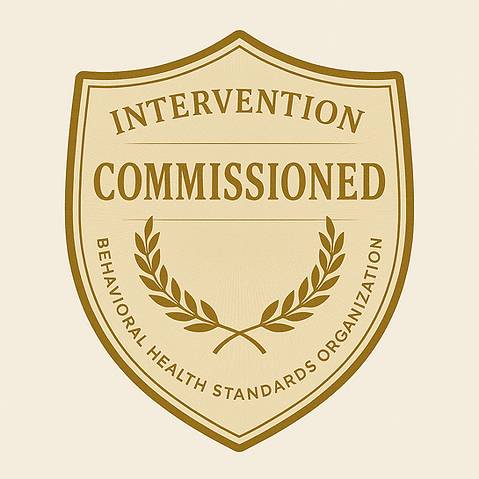


Commissioned by Standards. Guided by Purpose.
The Behavioral Health Standards Organization introduces a new mark of distinction: Commissioned Interventionist. This isn’t a certification — it’s a vetting. A formal recognition of those who meet the highest standard in ethics, training, and professional integrity in the field of intervention. Reserved for those who don’t just practice — they lead.
$2,500.00 Annual
Interventionist Commission Prerequisites
1. Education / Training Requirements
-
Completion of an Approved Intervention Education Program
Must complete one of the following:-
An interventionist training program accredited or recognized by BHSO (list of approved providers).
-
A behavioral health or addiction studies degree (Associate’s, Bachelor’s, or higher) plus a specialized intervention training certification from an approved third party.
-
-
Minimum 50 hours of formal instruction specifically covering:
-
Substance use disorders (SUD)
-
Mental health disorders
-
Family systems theory
-
Ethical considerations in intervention
-
Law and regulatory compliance
-
Cultural competency and diversity
-
Professional boundaries
-
Crisis management
-
Safety and liability awareness
-
2. Field Experience Requirements
-
Minimum 1,000 hours of documented field experience in behavioral health, addiction recovery, social work, counseling, or intervention.
(Roughly equivalent to 6–12 months full-time or 2–3 years part-time.) -
Minimum 10 interventions participated in as an assistant, case manager, or lead interventionist.
-
Minimum 5 interventions as lead (with a supervisor’s verification).
-
Must include a variety of cases: substance use, mental health, and dual diagnosis.
-
3. Background Check
-
National criminal background check required.
-
No felony convictions involving violence, sexual misconduct, or fraud in the last 10 years.
-
Any criminal history must be disclosed and subject to review by the BHSO Ethics Committee.
-
Must not be on any disqualification list from licensing boards or professional associations.
4. References
-
Minimum of three professional references, including:
-
At least one from a licensed clinical professional (LCSW, LMFT, LPCC, Psychologist, Psychiatrist).
-
At least one from a supervisor or program director where field hours were obtained.
-
Optional third from a family member or client if applicable (with proper waivers).
-
5. Ethics and Professional Standards
-
Must sign and agree to abide by the Behavioral Health Standards Organization Code of Ethics.
-
Must submit a signed ethics disclosure affirming:
-
No history of professional misconduct.
-
Agreement to report any future violations or ethical concerns immediately.
-
-
Complete a 4-hour Ethics and Boundaries Training Course every 2 years.
6. Continuing Education
-
Minimum of 20 hours of continuing education (CEUs) every two years, focused on:
-
Behavioral health
-
Substance use disorders
-
Family systems/intervention-specific skills
-
Crisis and trauma response
-
-
CEUs must come from an approved CE provider or an accredited institution.
7. Liability Insurance
-
Proof of professional liability insurance covering intervention services (minimum $1M/$3M policy).
8. Vetting Interview
-
Mandatory personal interview with the BHSO Accreditation Review Committee:
-
Assessment of professionalism, communication, ethical decision-making.
-
Practical scenario-based questioning (e.g., family refusal scenarios, hostile intervention scenarios).
-
9. Final Review / Endorsement
-
Review by the BHSO Accreditation Committee.
-
If approved, candidate receives:
-
Official BHSO Accreditation Designation (e.g., "Endorsed Intervention Professional – EIP").
-
Digital and physical credential for display.
-
Placement on the BHSO National Register of Vetted Interventionists (optional).
-